Moment When Redditor, Who Is Absolutely Terrified Of Dogs, Refuses To Pet The Uncle's Dog
There are people who are terrified of dogs. This may be because a dog chased them when they were young, they know someone who was bitten by a dog, or they were bitten themselves.
For whatever reason, some people are so afraid of dogs that it interferes with their lifestyle, prohibiting them from visiting friends' houses or going for walks in the open. Even those who have a severe fear of dogs can overcome their phobia and begin to feel more friendly toward man's best friend by realizing the source of their fear and learning about the many treatment options.
The majority of cynophobia (fear of dogs) cases start in early childhood. You are considerably more prone to developing a fear of dogs if the victim was yourself or a close friend or relative who was also physically wounded.
We don't really know why the OP in today's story is afraid of dogs, but according to the story, the fear has been present since childhood. The OP's uncle is annoyed about this and gets a dog with the intention of letting the dog get close to the OP.
The dog even jumped on the OP once, which made the OP very anxious. In fact, it's best you read the story for yourself below.
Would this Redditor be the AH for refusing to pet a dog belonging to the uncle?

He kept trying to put the dog next to the OP
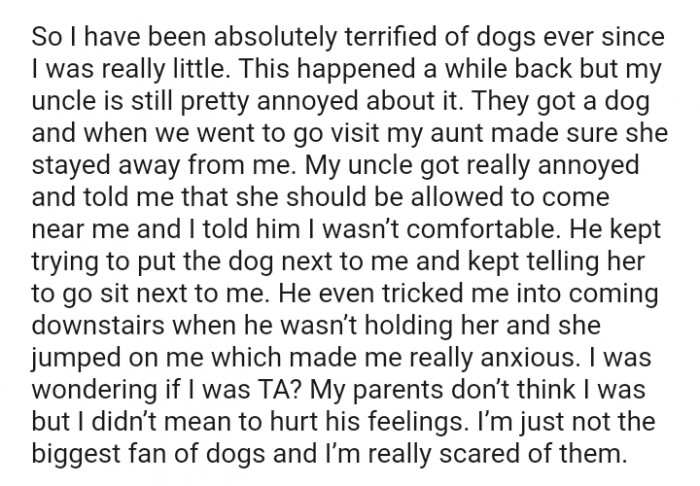
The OP replied to each and every comment dropped by other Redditors. Here are some of them below.
This Redditor would not want to pet anyone's dog

Understanding Fear Responses
The individual's fear of dogs illustrates a common psychological phenomenon known as specific phobia. Research by Dr. Michael Telch indicates that phobias often stem from past traumatic experiences or learned behaviors that create an exaggerated fear response.
This response can lead to avoidance behaviors, where individuals steer clear of situations that trigger their anxiety. Acknowledging the nature of this fear can help others understand the refusal to interact with the dog.
Understanding Fear Responses
The fear of dogs expressed by the Redditor may stem from various psychological factors, including past negative experiences or a lack of familiarity with dogs. Dr. Michelle Foster, a clinical psychologist at the University of Michigan, explains that specific phobias can develop from traumatic encounters or learned behaviors observed during childhood.
Research in the field of anxiety disorders shows that individuals with phobias often experience heightened anxiety in the presence of the feared object, which in this case is a dog. A study published in the Journal of Anxiety Disorders highlights that exposure therapy can be effective in gradually reducing fear responses in phobia sufferers.
You are allowed to be scared of dogs

There are enough non-sucky people to keep going

Your uncle is the AH here

Studies show that exposure therapy can be an effective method for treating specific phobias. According to research published in the Journal of Anxiety Disorders, gradual exposure to the feared object, in this case, dogs, can help reduce anxiety over time.
However, it’s crucial that exposure is conducted in a safe and controlled manner, allowing the individual to build confidence without feeling overwhelmed.
Moreover, societal attitudes toward dogs can influence individual perceptions. Cultural narratives often portray dogs as friendly companions, which can create pressure for individuals who do not share this sentiment. This discrepancy can lead to feelings of isolation or shame for not conforming to societal norms. According to Dr. William Doherty, a family therapist, "Understanding the diverse experiences individuals have with animals is crucial for fostering acceptance and reducing stigma." His insights highlight the importance of acknowledging different perspectives in our interactions with pets.
The OP's dad really got mad at the uncle
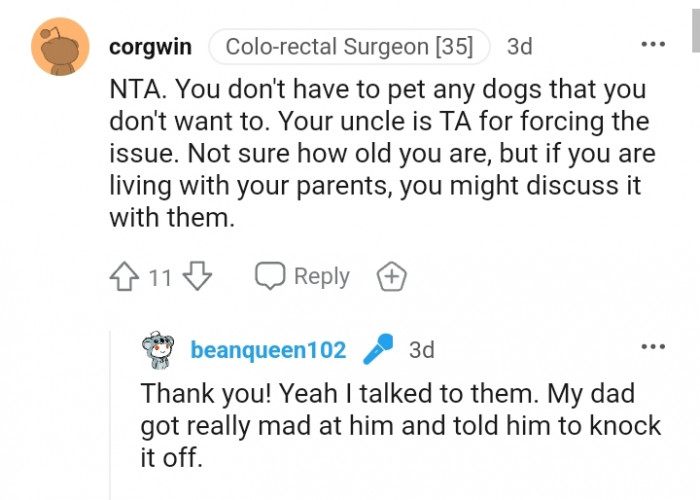
Many pet owners are guilty of this assumption

You don't have anything to feel apologetic for
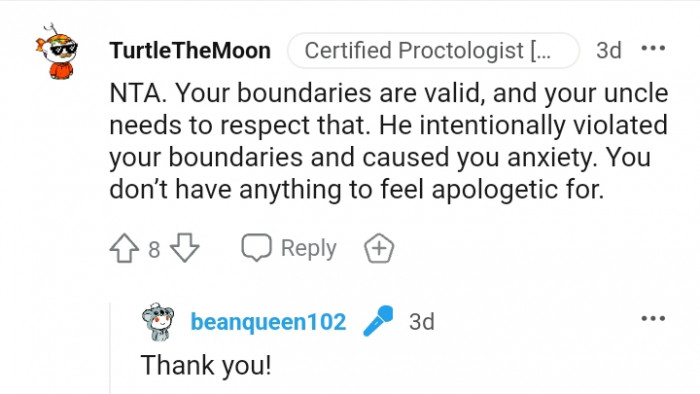
The Role of Empathy in Understanding Phobias
Empathy plays a key role in supporting individuals with phobias. According to Dr. Brené Brown, recognizing that fear is a valid emotional response can create an environment of understanding and compassion.
Encouraging family members to approach the individual with empathy rather than judgment can foster support and reduce feelings of isolation. This can be particularly helpful in family dynamics where misunderstandings may arise.
Coping Strategies for Fear of Dogs
For individuals dealing with a fear of dogs, gradual exposure can be a useful coping strategy. Experts recommend starting with small, controlled interactions, such as observing dogs from a distance before gradually getting closer. This method, known as systematic desensitization, has been shown to help individuals manage their anxiety effectively.
Research published in the Journal of Behavioral Therapy confirms the effectiveness of gradual exposure techniques in alleviating phobic responses.
It's pretty ridiculous that he's personally offended
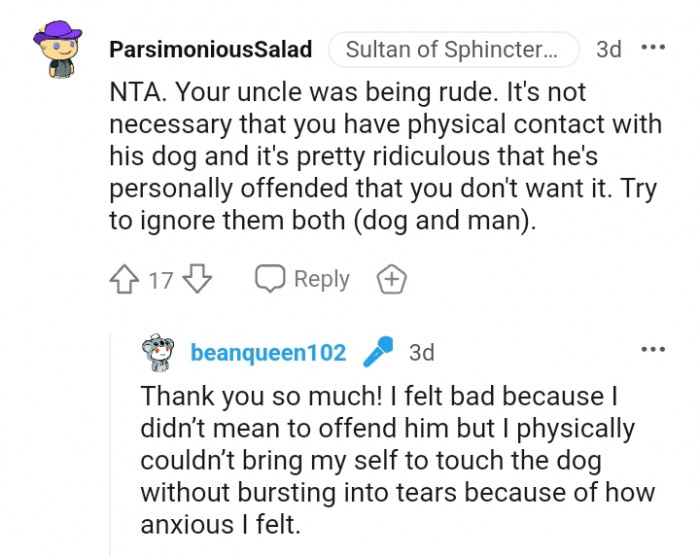
You did very well to stay calm like that

Not everyone loves your dog

It’s important to remember that phobias are not a sign of weakness; they are often deeply rooted in psychological factors. Research shows that cognitive-behavioral approaches can help individuals reframe their thoughts about their fears, ultimately reducing anxiety.
Encouraging the individual to seek professional guidance can empower them to work through their fear in a supportive way.
Additionally, mindfulness practices, such as deep breathing or visualization techniques, can assist in managing anxiety in the moment. Studies indicate that mindfulness can significantly reduce anxiety levels and help individuals feel more grounded during stressful encounters. A recent meta-analysis in the Journal of Clinical Psychology supports the use of mindfulness as an effective tool for managing anxiety symptoms.
Your uncle is being offended for no reason
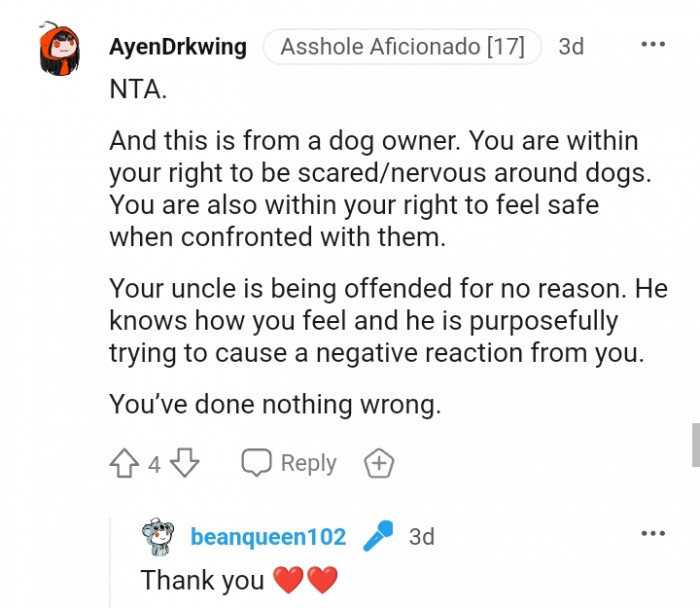
It is not hurting the dog's feelings

Your fear is valid and real

The Role of Understanding and Compassion
It's important for those around individuals with dog phobias to approach the situation with empathy and understanding. A supportive environment can significantly impact the individual’s ability to confront their fears. According to Dr. Laura Schlessinger, a psychologist at the University of Toronto, validation of feelings can create a safe space for individuals to explore their fears without judgment.
Research suggests that social support plays a crucial role in overcoming phobias. A study from the Journal of Social and Clinical Psychology found that individuals who receive understanding and encouragement from their social circles are more successful in managing their fears.
This Redditor would never force someone who did not want to pet a dog

It doesn't make it okay to disrespect your boundaries

You should be proud of yourself

This is not what exposure therapy looks like

It is really okay not to like dogs

It should be allowed to move freely about

It would be a perfect time to do some exposure therapy
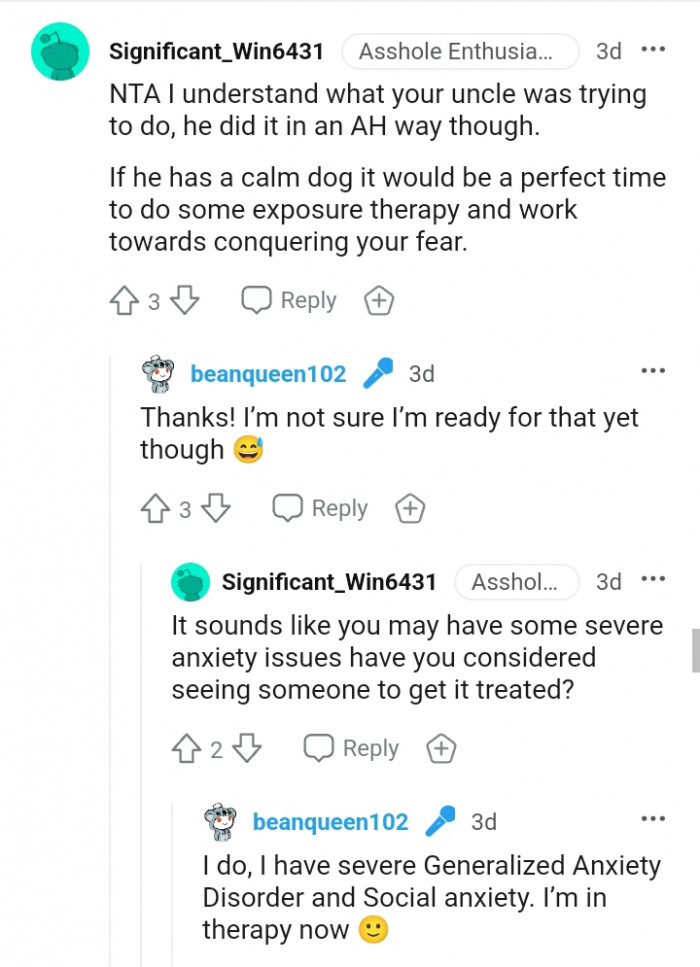
There are so many things that can cause one to be terrified of dogs. You might have felt intimidated or chased by dogs, and it's possible that you picked up your phobia of dogs indirectly.
It might have been a bad experience with a dog in the past. Nonetheless, people need to respect other people's feelings and not force their dogs on them.
Psychological Analysis
This situation illustrates the complexities of fear responses, particularly when societal expectations conflict with personal experiences. It's essential for individuals with these fears to approach their feelings with compassion and seek supportive environments that allow for gradual exposure to their fears.
Analysis generated by AI
Analysis & Alternative Approaches
In summary, addressing a fear of dogs requires a multifaceted approach that combines gradual exposure, mindfulness, and social support. Clinical psychologists emphasize the importance of understanding individual experiences and fostering empathy in overcoming fears. As Dr. Ramani Durvasula, a clinical psychologist, states, "Compassionate understanding is key to helping individuals confront their fears and build confidence." Creating a supportive environment can significantly aid in overcoming phobias and enhancing emotional well-being, as noted on her professional website.
Analysis & Alternative Approaches
In summary, understanding and addressing specific phobias requires compassion and patience. According to research, empathy and proper therapeutic interventions can significantly aid in the treatment of phobias.
By fostering a supportive environment, families can help individuals navigate their fears and develop healthier relationships with their anxieties.



